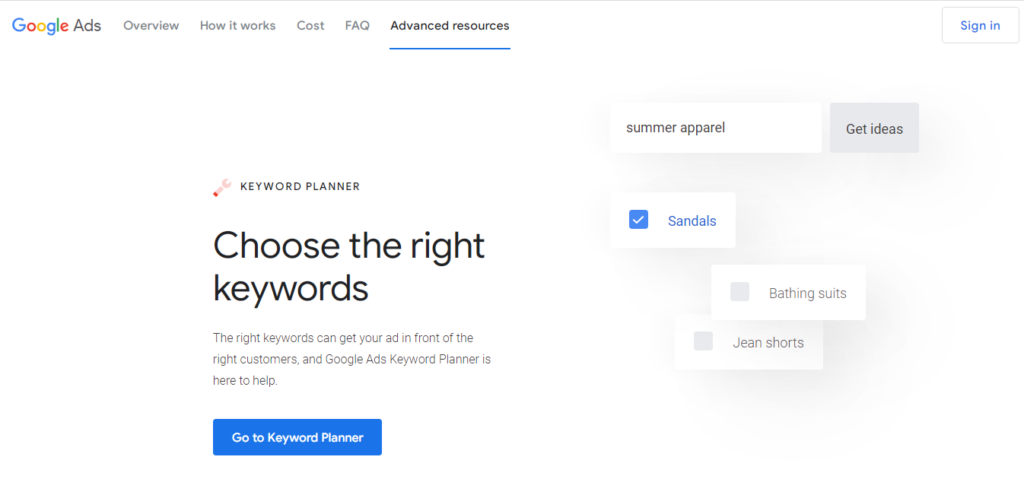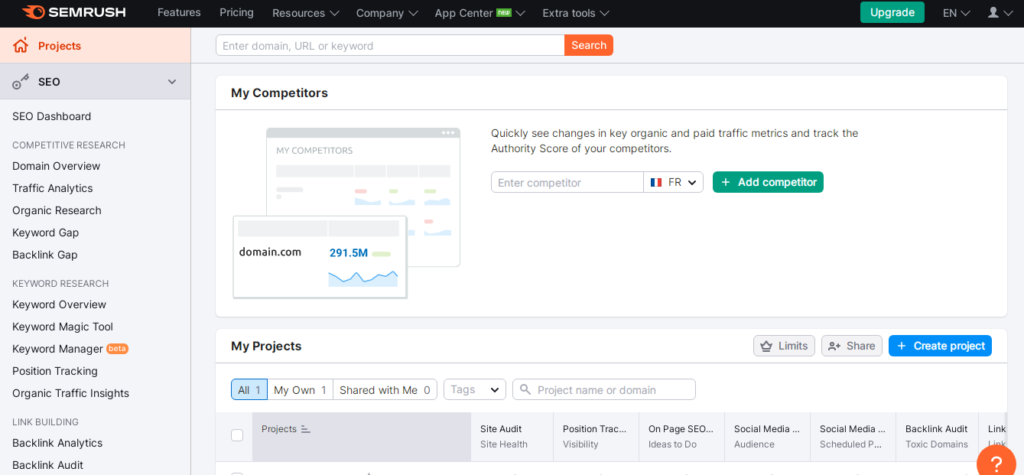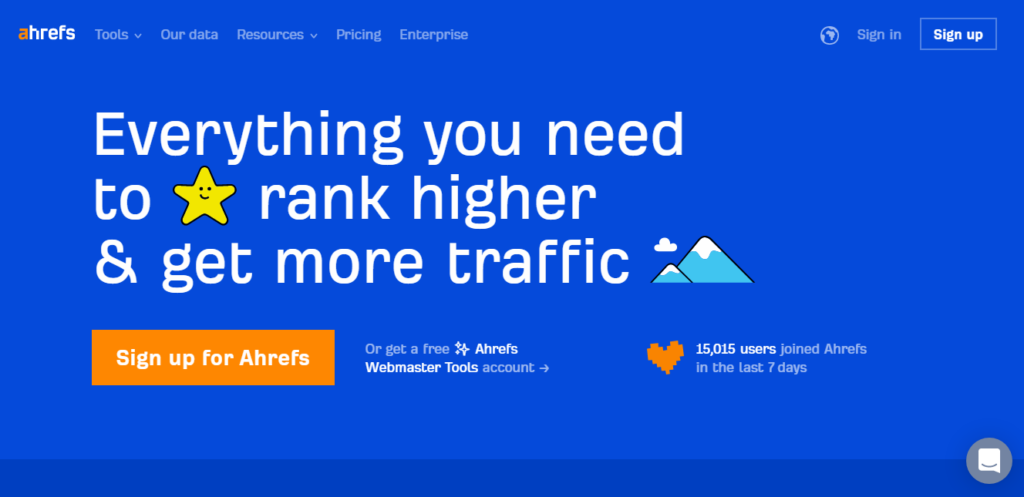
There are several keyword research tools available for SEO that can help you identify relevant keywords, analyze search volumes, competition, and find opportunities to optimize your content. Here are the top 3 most popular keyword research tools:
1- The Google Keyword Planner

The Google Keyword Planner is a tool provided by Google Ads (formerly known as Google AdWords) that allows advertisers to research and analyze keywords for their advertising campaigns. It helps advertisers find the most relevant and effective keywords to target in their ads by providing data on keyword search volume, competition, and suggested bid estimates.
The Keyword Planner offers various features and capabilities, including:
- Keyword Research: Advertisers can enter specific keywords, phrases, or URLs related to their products, services, or business to get keyword suggestions. The tool generates a list of relevant keywords along with search volume data, which indicates the average monthly searches for each keyword on Google.
- Search Volume Trends: The tool displays historical search volume trends for specific keywords over a selected time range. This information can be useful in identifying seasonal or trending keywords.
- Keyword Performance Insights: Advertisers can view performance metrics for keywords, such as competition level, suggested bid range, and average monthly searches. These insights help advertisers evaluate the competitiveness and potential impact of each keyword.
- Ad Group Ideas: The Keyword Planner provides ad group ideas based on the entered keywords. It groups related keywords together, making it easier to organize and structure ad campaigns.
- Budget Planning: Advertisers can estimate their budget and get bid suggestions for keywords. The tool provides a range of suggested bids that can help advertisers determine the potential cost and competitiveness of their campaigns.
It’s important to note that while the Google Keyword Planner is primarily designed for advertisers using Google Ads, it can also be a useful tool for content creators and SEO professionals looking to understand search volume and identify relevant keywords for their website optimization efforts.
2- SEMrush

SEMrush is a comprehensive and popular digital marketing tool used by professionals and businesses to analyze and optimize their online presence. It offers a wide range of features and functionalities to assist with search engine optimization (SEO), pay-per-click (PPC) advertising, content marketing, social media management, and competitive research.
Here are some key features and capabilities of SEMrush:
- Keyword Research: SEMrush provides a powerful keyword research tool that helps users discover relevant keywords for their SEO and PPC campaigns. It offers data on keyword search volume, competition level, related keywords, and long-tail keyword suggestions.
- Competitive Analysis: Users can analyze their competitors’ websites and marketing strategies using SEMrush. It provides insights into their organic and paid search keywords, backlinks, traffic sources, and advertising campaigns. This information can help users identify opportunities, improve their own strategies, and stay ahead of the competition.
- Site Audit and Optimization: SEMrush can perform comprehensive website audits to identify technical SEO issues, on-page optimization opportunities, and suggestions for improving website performance. It offers recommendations for enhancing website structure, content, and user experience.
- Backlink Analysis: Backlinks are crucial for SEO, and SEMrush offers tools to analyze backlink profiles. Users can identify their own backlinks, evaluate their quality and relevance, and analyze competitors’ backlink strategies. This information helps users build high-quality backlinks and improve their website’s authority.
- Rank Tracking: SEMrush allows users to monitor their website’s search engine rankings for specific keywords over time. It provides insights into keyword positions, visibility, and ranking changes. Users can track their performance against competitors and make data-driven decisions to improve their rankings.
- Advertising Research: SEMrush offers valuable data and insights for PPC advertisers. Users can analyze competitors’ ad strategies, keywords, ad copy, and landing pages. It also provides an estimation of competitors’ advertising budgets and suggests optimization opportunities.
- Content Marketing: With SEMrush, users can discover popular and trending topics, analyze content performance, and find content gaps in their industry. It helps users create optimized content strategies, track content performance, and improve engagement.
SEMrush is widely used by digital marketers, SEO professionals, content creators, and businesses of all sizes to enhance their online presence, drive organic and paid traffic, and gain a competitive advantage in the digital landscape.
3- Ahrefs

Ahrefs is a powerful and widely-used SEO (search engine optimization) toolset that provides a comprehensive suite of features and data to help users improve their website’s search rankings, analyze competitors, and optimize their online presence. It offers a range of tools and insights for keyword research, backlink analysis, content optimization, rank tracking, and more.
Here are some key features and functionalities of Ahrefs:
- Site Explorer: Ahrefs’ Site Explorer allows users to analyze any website or URL and obtain valuable insights. It provides data on organic search traffic, backlinks, referring domains, top-performing content, and organic keyword rankings. Users can gain a deep understanding of their own website’s performance or analyze competitors to identify areas of improvement.
- Keyword Research: Ahrefs offers a robust keyword research tool that helps users discover relevant keywords for their SEO and content strategies. Users can find keyword ideas, analyze search volume, assess keyword difficulty, and explore keyword variations. The tool provides insights into click-through rates (CTR) and offers keyword suggestions based on search queries and search engine autocomplete.
- Backlink Analysis: Ahrefs is renowned for its extensive backlink data. It allows users to analyze their own backlink profile and track the quality and quantity of backlinks. Users can identify referring domains, view anchor text distribution, analyze backlink growth over time, and assess the authority of linking websites. This information helps users understand their link profile and devise strategies to build high-quality backlinks.
- Content Explorer: Ahrefs’ Content Explorer enables users to discover popular and trending content in their industry. Users can search for keywords or topics and find the most shared and linked-to content. This helps users identify content ideas, understand what resonates with their audience, and create engaging and shareable content.
- Rank Tracker: Ahrefs provides a rank tracking feature that allows users to monitor their website’s organic keyword rankings over time. Users can track their rankings on a global or local level, identify ranking fluctuations, and compare their performance against competitors.
- Site Audit: Ahrefs’ Site Audit tool helps users identify and fix technical SEO issues that may be affecting their website’s performance. It scans websites for common SEO problems, such as broken links, missing meta tags, slow page speed, and more. Users receive comprehensive reports with recommendations to improve their site’s SEO health.
- Competitive Analysis: Ahrefs offers robust competitive analysis capabilities. Users can analyze their competitors’ websites, backlink profiles, top-performing content, and organic keyword rankings. This information helps users identify their competitors’ strategies, find opportunities, and benchmark their own performance.
Ahrefs is widely used by SEO professionals, digital marketers, content creators, and businesses to optimize their websites, improve search rankings, and stay ahead of the competition in the online landscape.
Conclusion
The effectiveness of a keyword research tool may vary based on your specific needs and preferences. It’s recommended to explore different tools and find the one that aligns with your SEO goals and budget, or you can hire an SEO agency to do all the hassle at your behalf.






keyword research can be even tricky, I had to change the target keywords many times over the past months, but still being dominated by my competitors, any tips Marouane for this? thank you
Hi Patricia, the keywordresearch is just a small part of SEO, maybe your competitors dominate you for other on-site or/and technical SEO, try to get high quality backlinks, optimize your off-site seo, fix technical SEO errors, … I invite you to check my Youtube Channel (Marouane Number 1) you will find very useful SEO tutorial.
Goodluck
You are right Marouane, keyword optimization ain’t everything, there is some huge work to do for technical SEO and off-page SEO
as always, thank you so much for the great information and knowledge, I have spent thousands on paid ads, without a high ROI, now I am trying to learn SEO